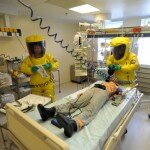Last weekend, the minister of Health said that enough precautionary measures against Ebola have been taken and that the situation is currently under control. Dr Van Ranst acknowledges in the VRT radio programme ‘De ochtend’ that, while a lot of effort has been put in, there is always room for improvement.
Common sense
“The hospitals tasked with taking care of Ebola patients during a possible outbreak, have invested a lot of time, effort and money into their preparations. On the other hand, extra precautionary measures are needed, like taking the temperature of passengers flying in from Monrovia, Conakry and Freetown. This would not be hard to do, as there are only 6 flights a week. Other countries have started doing this as well and it seems like a good idea”, says Dr Van Ranst.
The World Health Organisation has not yet decided which extra measures against Ebola should be taken. “At the moment, the World Health Organisation is still debating on whether extra precautions like these are necessary. However, some countries like the United Kingdom and the United States are taking the lead”, according to Dr Van Ranst. “When flights hauling from the affected countries arrive on their soil, all passengers’ temperatures are checked.”
Dr Van Ranst expects that these checks will soon come into action in Belgium as well. “It seems like common sense to take these precautions. I think that temperature checks will eventually become commonplace in Belgium and they could prove to be very useful.”
Neder-Over-Heembeek
During the past couple of days, it was stated in the media that Belgian hospitals aren’t suitably equipped to deal with the viral disease and that Ebola patients would have to be treated abroad. According to Dr Van Ranst, this is an exaggerated statement. “It’s not simple to send these patients abroad and I am convinced we can treat them here.”
“A good place to start would be the military hospital in Neder-Over-Heembeek (Brussels). It’s secluded and there’s definitely enough space. To organise an operation like this would require a lot of effort and money, but it is certainly not impossible.”
“However, we can’t predict the future”, Dr Van Ranst emphasises. “No one expected this outbreak to be this big and to last for as long as it has. In the last twenty years, experience taught us that Ebola outbreaks only last for a very short amount of time. However, this one rages on and we need to take action.”
















